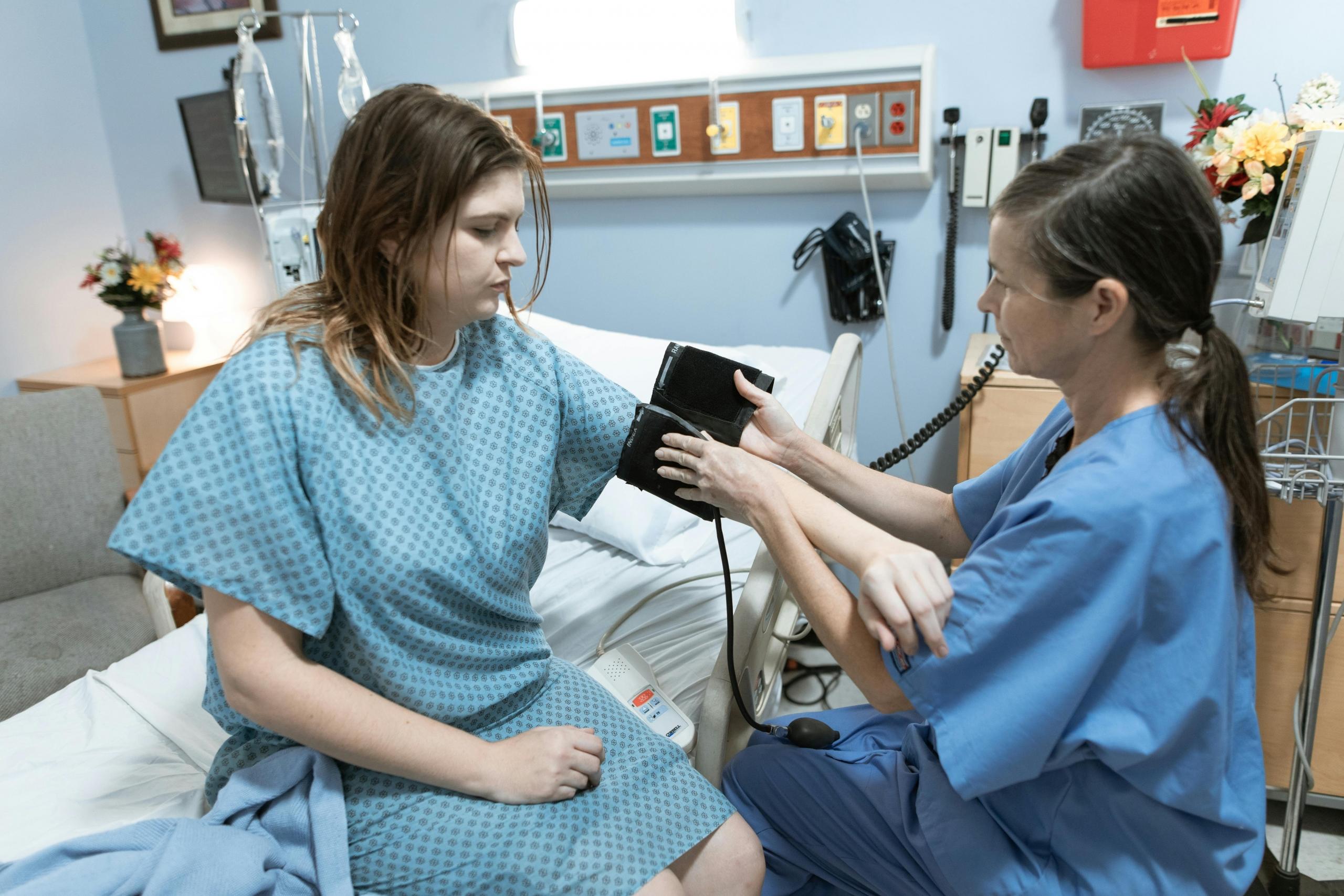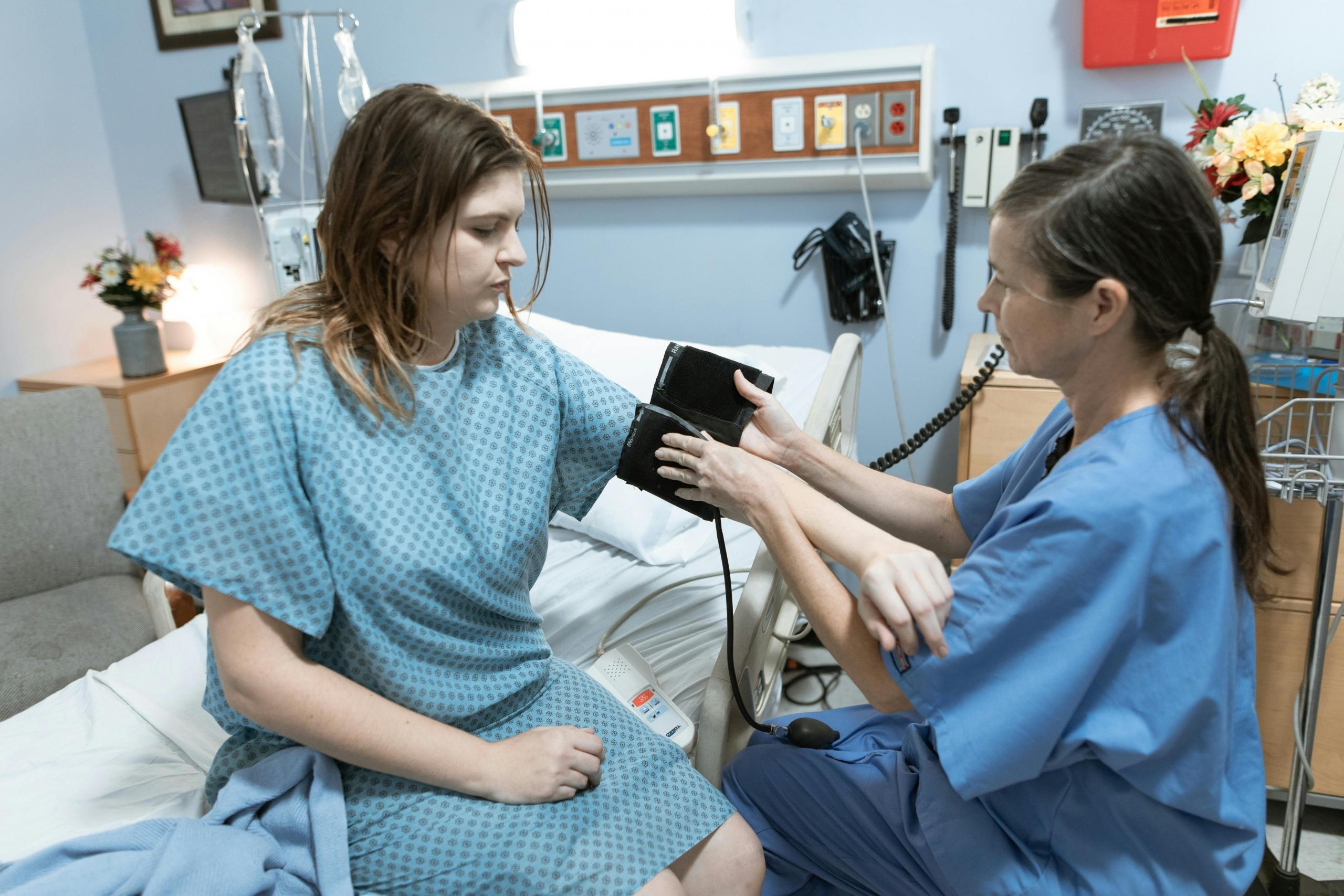Hospital nurses, also known as registered nurses (RNs), are the backbone of healthcare delivery in medical settings across Canada.
These dedicated professionals undertake many responsibilities to ensure optimal patient care and support. Hospital nurses are vital in promoting patient well-being, from conducting patient assessments and administering medications to providing emotional support and advocating for patients' needs.
While other nurses, such as public health nurses, also do these things, their focus and responsibilities lie elsewhere.

What Does a Hospital Nurse Do?
If you've seen the TV show Grey's Anatomy, you might have a particular image of hospital nurses. However, their role extends far beyond what's depicted on the screen.
Hospital nurses are at the forefront of patient care and are responsible for thoroughly assessing patients' conditions. This includes measuring vital signs, gathering medical histories, and identifying symptoms to ensure accurate diagnosis and treatment.
Additionally, hospital nurses collaborate closely with multidisciplinary healthcare teams comprising doctors, surgeons, and technicians. They develop and implement comprehensive care plans customized to meet each patient's unique needs.
This collaborative approach ensures patients receive holistic and personalized care throughout their hospital stay.
How to Become a Hospital Nurse?
Becoming a hospital nurse requires meeting specific educational requirements and possessing essential personal skills. Let's delve into what it takes to embark on this rewarding career path:
Educational Requirements
Hospital nurses typically begin their journey with an Associate Degree in Nursing (ADN), the entry point for hospital nursing positions. ADN programs cover fundamental nursing courses, including anatomy, physiology, biology, psychology, and patient care.
Alternatively, aspiring hospital nurses can pursue a Bachelor of Science in Nursing (BSN), which offers a more comprehensive education. BSN programs encompass liberal arts, mathematics, and science prerequisites, providing graduates with a broader skill set and more opportunities for advancement.
Some nursing specialties, such as mental health, anesthesiology, pediatrics, and emergency care, may require a Master’s Degree in Nursing (MSN). These advanced degrees offer specialized training and expertise in specific areas of nursing practice.
An aspiring hospital nurses must complete prerequisite courses in basic anatomy, physiology, biology, and psychology before enrolling in nursing school.
A strong foundation in mathematics and science is essential for success in nursing education and practice.
Personal Skills
Hospital nurses require distinct personal skills tailored to their unique healthcare settings. Due to hospital environments' fast-paced and unpredictable nature, they must excel in adaptability, quick decision-making, and emergency response.
They must also navigate complex situations, collaborate closely with multidisciplinary teams, and manage multiple tasks simultaneously.
Compared to clinic nurses, who typically work in more structured outpatient settings, hospital nurses face more urgency and intensity in their daily responsibilities. While both roles demand adaptability and critical thinking, hospital nurses often encounter more acute and emergent situations, requiring them to remain calm under pressure and prioritize patient care efficiently.
Additionally, hospital nurses may need to coordinate with various departments and specialists to ensure seamless patient care transitions.

What Responsibilities Do Hospital Nurses Have?
Hospital nurses are at the forefront of patient care, with responsibilities spanning various critical areas.
Patient Assessment and Monitoring
They continuously evaluate patients' health status, meticulously observing vital signs and symptoms. Rapid identification of any changes or complications is paramount, facilitating timely intervention.
Medication Administration
Administering medications accurately and safely is a cornerstone of nursing practice. Nurses meticulously calculate dosages, ensure proper routes of administration, and vigilantly monitor patients for any adverse reactions or side effects.
Patient education regarding medications is also a crucial aspect of their role.
Wound Care and Dressing Changes
Hospital nurses adeptly manage wounds, surgical sites, and injuries. They skillfully perform dressing changes, assess wound healing progress, and diligently work to prevent infections, ensuring optimal patient recovery.
IV Therapy and Intravenous Medications
Another vital responsibility is inserting and maintaining intravenous lines for fluid administration, medication delivery, and blood transfusions. Alongside this, nurses monitor IV sites vigilantly, promptly addressing any complications that may arise.
Patient Advocacy
Advocating for patients' rights, preferences, and well-being is integral to nursing practice. Hospital nurses ensure that patients receive respectful, compassionate care and that their voices are heard throughout their healthcare journey.
Emergency And Trauma Response
Hospital nurses are trained to respond swiftly and effectively to emergencies such as cardiac arrests, respiratory distress, or traumatic injuries. Their ability to initiate life-saving interventions and coordinate with the healthcare team can be critical in these high-pressure situations.
Documentation and Charting
Accurate documentation of assessments, treatments, and patient responses is essential for effective communication, continuity of care, and legal compliance. Hospital nurses meticulously maintain detailed records to support informed decision-making and ensure patient safety.
Patient Education and Discharge Planning
Educating patients about their conditions, treatment plans, and self-management strategies is a key aspect of nursing care for both hospital nurses and other types of nursing, such as community nurses.
Hospital nurses also play a vital role in discharge planning, equipping patients with the knowledge and resources needed for a smooth transition to home or another care setting.

Career Opportunities as a Hospital Nurse
As a hospital nurse in Canada, you have a wide array of career opportunities available within hospital settings, each offering unique roles and responsibilities.
Medical-Surgical Units
Nurses working in medical-surgical units care for patients with a wide range of medical conditions, both acute and chronic. They provide comprehensive nursing care, including medication administration, wound care, patient education, and coordination of care with other healthcare professionals.
Intensive Care Units (ICUs)
ICU nurses specialize in providing critical care to patients with life-threatening conditions or who require close monitoring and specialized interventions. They manage complex medical equipment, administer medications, monitor vital signs, and collaborate closely with physicians to stabilize and improve patients' conditions.
Emergency Departments
Nurses in emergency departments handle urgent and critical cases, including trauma, injuries, and acute illnesses. They assess patients quickly, prioritize care based on severity, and coordinate with other healthcare providers to deliver timely and efficient treatment.
Pediatrics
Much like school nurses, pediatric nurses specialize in providing healthcare to infants, children, and adolescents. They assess developmental stages, administer pediatric medications, provide family-centered care, and support children and their families through various healthcare experiences.
Oncology
Oncology nurses care for cancer patients, offering support, symptom management, and treatment coordination throughout the cancer care continuum. They also educate patients about cancer treatments, monitor for treatment side effects, and offer emotional support to patients and their families.
Within these departments, hospital nurses can further specialize in roles such as Critical Care Nurse, Operating Room (OR) Nurse, Labor and Delivery Nurse, Psychiatric Nurse, and Rehabilitation Nurse, tailoring their expertise to meet the specific needs of patients in critical, surgical, maternal, mental health, and recovery settings.
Hospital nurses can also pursue career advancement by transitioning into leadership positions such as nurse managers, clinical educators, or nurse practitioners, which are made possible through ongoing education, specialized training, and professional growth opportunities.

What Is the Average Salary for a Hospital Nurse in Canada?
Hospital nurses in Canada typically earn an average annual salary ranging from $71,458 to $95,540. For instance, hospital nurses generally command higher salaries than community nurses due to their roles in acute care settings, where they manage complex medical conditions and often work irregular shifts.
Various factors influence the salary of hospital nurses. Experience plays a significant role, with nurses accruing more years typically commanding higher salaries. Location also matters, as salaries can vary significantly depending on the province or city, with urban centers often offering higher pay.
Additionally, specialization in areas like critical care, oncology, or neonatal care may result in additional compensation.
Furthermore, hospital nurses working evening, night, or weekend shifts typically receive extra pay for their irregular hours.
Hospital nurses can advance their careers by obtaining specialized certifications, such as critical care nursing or pediatric nursing. Leadership roles, such as nurse managers or clinical educators, often offer higher salaries and increased responsibilities, providing opportunities for further career growth and development.
To learn about the different types of nurses, check out our article on the topic.
Conclusion
Hospital nurses are indispensable in providing top-tier healthcare across Canada. They assess patients, administer medications, provide wound care, and educate patients.
Hospital nursing offers a fulfilling career path with diverse opportunities in medical-surgical units, ICUs, emergency departments, pediatrics, and oncology. Nurses typically earn competitive salaries influenced by experience and specialization.
Through ongoing education and dedication, hospital nurses ensure optimal patient care, making a profound impact on healthcare outcomes.
Summarize with AI:















